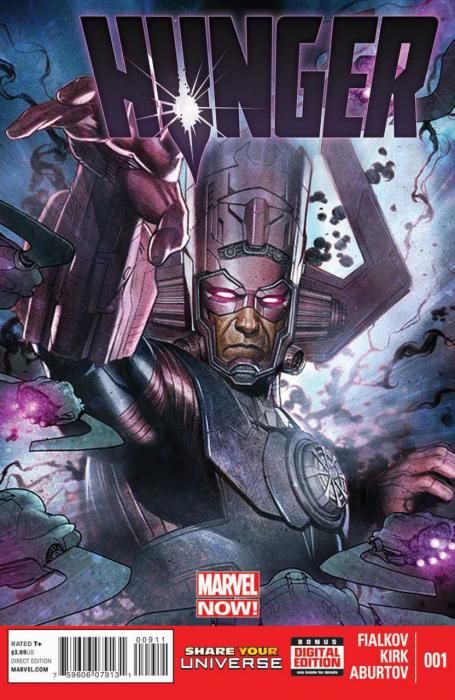I ignored "Age of Ultron" as much as humanly possibly (or comics reviewer possible), as I do with all big event books, so I was surprised to find Joshua Hale Fialkov and Leonard Kirk's "Hunger" #1 a compelling and engaging start to a miniseries, considering it was born of a crossover I tried my damndest not to read.
Kirk's artwork is perfect for all the epic space battles and high tech mumbo jumbo that this issue demands. His strengths aren't in character expressions and real world banality, but then, he doesn't need much of that to excel on this issue. When it comes to spaceships, space battles, forced teleportation, and Galactus madness, he absolutely brings it. While slightly weak on the more real-world things -- like florescent lit skin tones give colorist Jesus Aburtov a panel bursting with glowing yellow teleportation effects, and the book just sings. And since the book is far more teleportation, the vastness of space and aliens, the weaknesses in the art are largely inconsequential.
Cory Petit's lettering is well done, particularly when it comes to how he handles The Watcher, whose dialogue, even while talking through Rick Jones is in red ink, while Rick (and everyone else) speaks in regular black ink. A simple trick, the results are astonishingly effective. It's far less fussy and difficult to read than balloons of a different color (as we frequently get) and thus a good call by Petit.
The real star of "Hunger" #1, however, is Fialkov's writing, which is bright, fun and surprisingly easy to follow despite a pretty dense concept (at least for someone not that used to Marvel's Ultimate Universe). Rick Jones makes for a great point of view character, and The Watcher, sometimes talking through Jones and sometimes through other characters, makes for a fantastic if completely unorthodox "sidekick" of sorts. Perhaps most impressive of all is how well Fialkov manages to contrast the humorous and light personality of Jones with the deadly serious and seriously epic battle going on around him. Overly earnest work sometimes falls painfully flat, so it's always with come hesitancy that I enter into something so grandiose as "Hunger" #1 appears to be, but Fialkov's down to earth approach (so to speak) really sells it. As a result, a concept I wasn't necessarily interested in becomes a story I'm intrigued enough about to keep reading. In the end, Fialkov's contrast of the intimate and the monumental is more than enough to warrant a return for issue #2.

